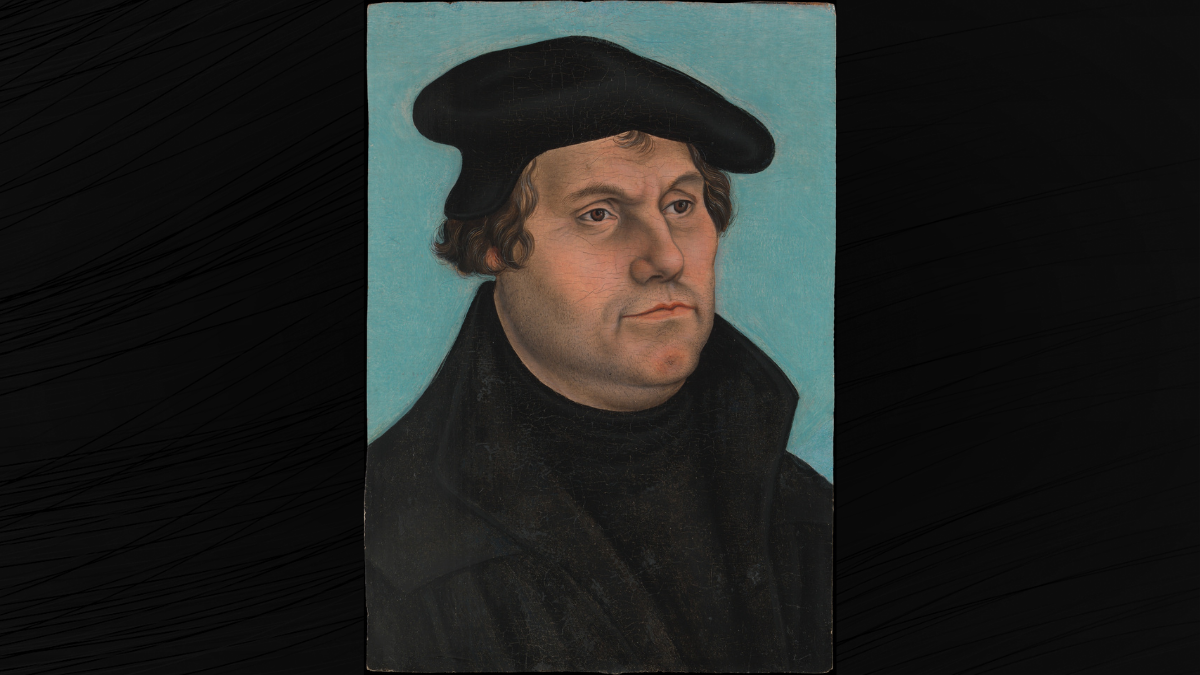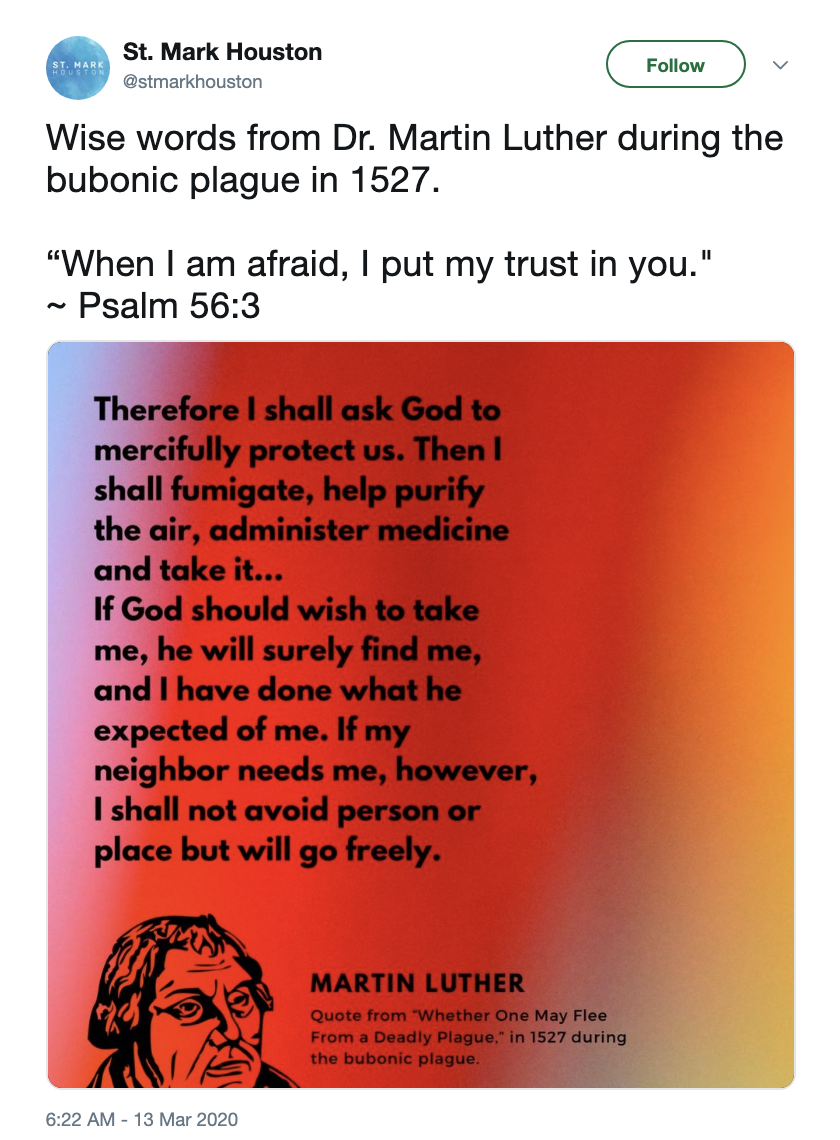While widely-shared memes and online posts during the COVID-19 pandemic quoted accurately from Luther's writings, they gave the misleading impression that Luther proposed leaving one's health to fate, and omitted sections in which he criticized those who "distain the use of medicines" and "do not avoid places and persons infected by the plague, but lightheartedly make sport of it."
During the COVID-19 pandemic in 2020 and 2021, an old quotation attributed to the 16th-century German theologian Martin Luther gained prominence online, especially among Christians, as millions of people navigated the disruption and difficulty caused by the virus.
In memes, social media posts, and blog posts published by various churches, roughly the same words were included, and the quotation was typically described as deriving from a letter Luther wrote to Johan Hess, in the context of the Black Death:
Therefore I shall ask God to mercifully protect us. Then I shall fumigate, help purify the air, administer medicine and take it... If God should wish to take me, he will surely find me, and I have done what he expected of me. If my neighbor needs me, however, I shall not avoid person or place but will go freely.
— Martin Luther. "Whether One May Flee From a Deadly Plague."
That quotation was accurate, and was rightly attributed to Luther, a key figure in the Protestant Reformation who died in 1546. As such, we are issuing a rating of "Correct Attribution." However, the memes omitted parts of the same letter in which Luther warned Christians not to wantonly or needlessly risk their own health, and the health of others, stating that such behavior was morally equivalent to "suicide" and "murder."
The original source of Luther's musings about the bubonic plague that devastated Europe in the Middle Ages was his 1527 letter to a fellow Reformation leader.
That summer and fall, according to a 1968 collection of Luther's writings, the plague badly affected the German city of Wittenberg, site of the university where Luther served as chair of the theology department.
Two hundred miles to the east, in Breslau, now the city of Wrocław in modern-day Poland, Luther's fellow Reformationists debated whether it was appropriate for Christians to flee a bubonic plague hotspot, and wrote to Luther seeking his advice. His response came in the form of an open letter addressed to Johann Hess, a Reformation leader in Breslau.
The letter can be read in its original German, here, and an English translation by Carl Schindler can be read in full here. It was finished around November 1527, and was turned into a widely-distributed 14-page pamphlet.
In it, Luther encourages Christians who have a duty of care to others, like sick relatives or neighbors, to stay and tend to them. However, he advises that anyone without such responsibilities should flee the plague, rather than tempt God's wrath by unnecessarily risking exposure to it.
The sections included in the widely-shared memes and online posts during COVID-19 can be found towards the end of the letter. As translated by Schindler, Luther wrote:
You ought to think this way: "Very well, by God's decree the enemy has sent us poison and deadly offal. Therefore I shall ask God mercifully to protect us. Then I shall fumigate, help purify the air, administer medicine, and take it. I shall avoid places and persons where my presence is not needed in order not to become contaminated and thus perchance infect and pollute others, and so cause their death as a result of my negligence.
"If God should wish to take me, he will surely find me and I have done what he has expected of me and so I am not responsible for either my own death or the death of others. If my neighbor needs me, however, I shall not avoid place or person but will go freely, as stated above..." [Emphasis is added].
It is striking that the memes and online posts shared widely in 2020 and 2021 conspicuously left out those passages from this section of Luther's letter that warned Christians not to needlessly risk exposing themselves or others to the plague.
For example, the memes omitted the sentence which states "I shall avoid places and persons where my presence is not needed in order not to become contaminated and thus perchance infect and pollute others."
Whether deliberate or not, the result of these omissions was likely to be that the reader would have the distorted impression that Luther's approach to the COVID-19 pandemic might have been to eschew social distancing, face-masking, and other mitigation strategies. In fact, earlier in the letter he issued a searing condemnation of those who wantonly risked their health, and the health of others, drawing a moral equivalence to "suicide" and "murder." Luther wrote:
They are much too rash and reckless, tempting God and disregarding everything which might counteract death and the plague. They distain the use of medicines; they do not avoid places and persons infected by the plague, but lightheartedly make sport of it and wish to prove how independent they are. They say that it is God's punishment; if he wants to protect them he can do so without medicines or our carefulness. This is not trusting God but tempting him. God has created medicines and provided us with intelligence to guard and take good care of the body so that we can live in good health.
If one makes no use of intelligence or medicine when he could do so without detriment to his neighbor, such a person injures his body and must beware lest he become a suicide in God's eyes. By the same reasoning a person might forego eating and drinking, clothing and shelter, and boldly proclaim his faith that if God wanted to preserve him from starvation and cold, he could do so without food and clothing. Actually that would be suicide.
It is even more shameful for a person to pay no heed to his own body and to fail to protect it against the plague the best he is able, and then to infect and poison others who might have remained alive if he had taken care of his body as he should have. He is thus responsible before God for his neighbor's death and is a murderer many times over.
Sources:
How St. James Lutheran Is Responding to the Coronavirus Threat – St. James Lutheran Church. https://stjameslutheranchurch.com/how-st-james-lutheran-is-responding-to-the-coronavirus-threat/. Accessed 25 Aug. 2021.
Luther, Martin - Ob Man Vor Dem Sterben Fliehen Möge [Glaubensstimme - Lass Mich Aufs Feld Gehen Und Ähren Auflesen ]. https://www.glaubensstimme.de/doku.php?id=autoren:l:luther:o:ob_man_vor_dem_sterben_fliehen_moege. Accessed 25 Aug. 2021.


